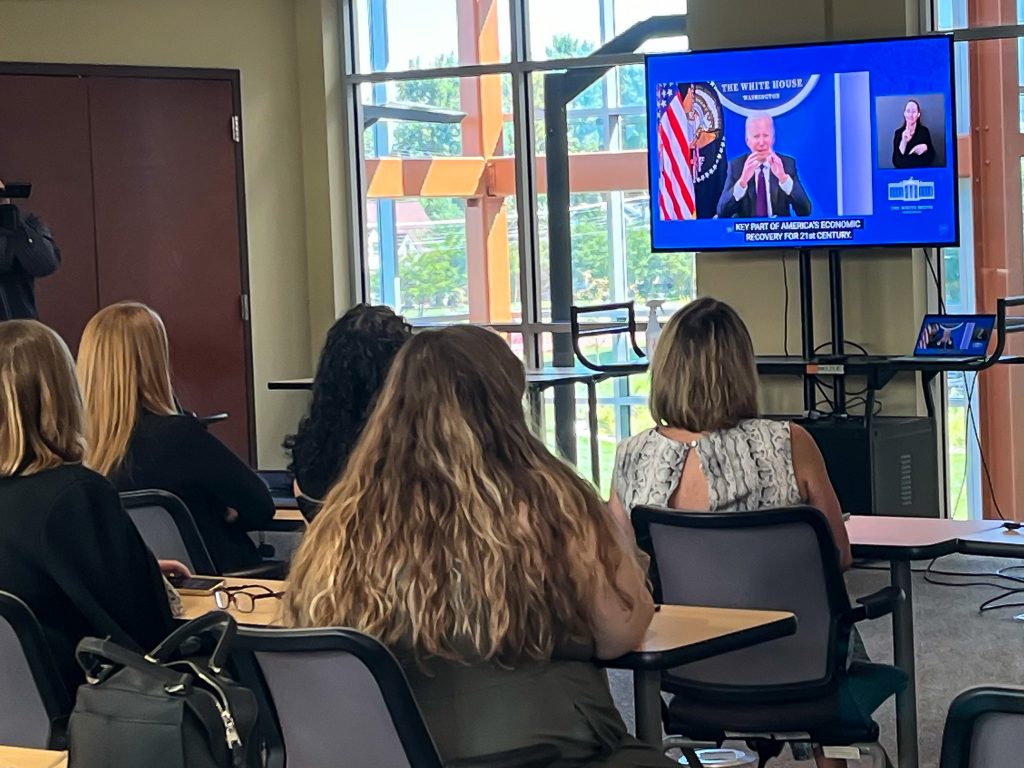The Binghamton University New Energy New York (NENY) project was awarded $63.7 million from the U.S. Economic Development Administration (EDA) on Friday.
After being named a finalist for the grant in December, BU has been chosen as one of the 21 winners in the $1 billion Build Back Better Regional Challenge. This challenge is a part of the EDA and U.S. President Joe Biden’s plan to improve regional economies and provide better jobs in clean energy, next-generation manufacturing and biotechnology industries across America, according to the White House website. In addition to the $63.7 million from the EDA, BU will also receive another $50 million from New York state to help fund the next steps in the NENY proposal.
Led by M. Stanley Whittingham, distinguished professor of chemistry and 2019 Nobel Prize winner, this proposal is a part of a plan that looks to establish upstate New York as a hub for lithium-Ion battery production, and in doing so, create thousands of jobs. Broome County will be the home of the first factory where battery production will take place.
Both Biden and Gina Raimondo, secretary of the U.S. Department of Commerce, spoke at a conference Friday, expressing trust in each of the regions that were chosen. Raimondo said the Build Back Better challenge was a product of the $3 billion American Rescue Plan, passed in March of 2021.
Raimondo explained that she was directed to use the money to make investments, helping revitalize communities and get ready for a transition in the economy during and after the COVID-19 pandemic.
“People want to work where they live, and they want to be able to do that,” Raimondo said in the press conference. “So that’s what this is all about. We believe every single American, no matter where you live, ought to have an opportunity to have a high paying, family supporting job in that community.”
William Acker, executive director of the New York Battery and Energy Storage Technology Consortium, said the grant for the NENY project has good timing, especially after the recent passing of the Inflation Reduction Act, which included important clauses for battery manufacturing. He explained what the NENY proposal means for the region.
“[NENY] will allow for small companies to commercialize products here in the U.S.,” Acker said. “It will allow us to leapfrog the technology of existing technologies, scale manufacturing, create workforces and do the supply chain connections we need. It will have equity, justice, diversity and innovation built into it as well.”
BU President Harvey Stenger also acknowledged the help and dedication provided by New York State Gov. Kathy Hochul and Sen. Chuck Schumer, which he believes ultimately led to the University’s final award of more than $113 million for NENY.
Several students across the campus expressed a positive reaction toward the award.
Connor Kanyuk, a senior majoring in chemistry, said he was excited to see this project “really take off,” and for BU to try and build prestige.
“This is huge for the University since this is where lithium-Ion batteries originated from,” Kanyuk wrote in an email. “It’s amazing they’re getting national recognition for these achievements as well as funding to really take off with this project and solidify this identity and legacy for [BU].”
Manon Casali, an undeclared sophomore, was also optimistic about the future of NENY. Casali suggested that it is an opportune time for this project to be funded, so it might become easier to meet economic demands.
“It is fascinating that the University I go to and Broome County will be the hub for battery manufacturing in the state,” Casali wrote in an email. “It’s nice that the University is getting recognition for this project. I think it will be great for practicality since the batteries are in increasing demand, and for more people to find jobs in upstate New York.”
Whittingham expressed excitement for the future of NENY, a project that started out as an idea, which he has been working on for decades.
“I have been looking forward to this day for more than 50 years,” Whittingham said. “Back to when we came up with lithium-Ion batteries but were not able to develop them because no American company had the investment dollars to do it. What we hope with this program is to turn that around and have batteries made in America, particularly made in New York state. We are going to build that infrastructure here. We are going to make a cleaner economy and at the same time we are going to rejuvenate this region.”



